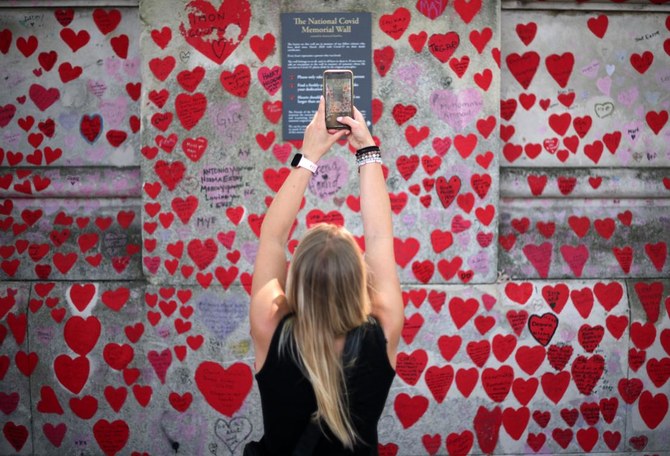LONDON: The UK government’s focus on Brexit seriously hampered pandemic planning, an inquiry examining the country’s handling of the COVID-19 health emergency was told on Tuesday.
Hugo Keith, lead lawyer to the COVID-19 inquiry which is holding its first public session, said the country’s departure from the European Union had “required an enormous amount of planning and preparation.”
“It is clear that such planning, from 2018 onwards, crowded out and prevented some or perhaps a majority of the improvements that central government itself understood were required to be made to resilience planning and preparedness.”
The UK suffered one of the worst COVID-19 death tolls in Europe with more than 128,500 fatalities recorded by mid-July 2021.
The current toll of deaths with COVID-19 on the death certificate stands at just over 227,000, according to the latest government figures.
Chaired by retired senior judge Heather Hallett, the first phase of the inquiry is focusing on the UK’s resilience and preparedness.
But relatives of people who died have already condemned the inquiry for failing to include them and say it will be a “farce” if they are not able to testify.
Members of the COVID-19 Bereaved Families for Justice campaign lined up outside the inquiry in central London holding pictures of their loved ones.
“Without learning from the experiences of our members, how can the inquiry properly evaluate the decisions made by those in charge?” group member Barbara Herbert, who lost her husband Paul to COVID, said earlier this week.
“We are people that will be able to put reality to the theory that Hallett is testing, that has got to happen, otherwise it’s just a farce,” added Saleyha Ahsan, a doctor whose father Ahsan-ul-Haq Chaudry also died.
Launching proceedings, Hallett pledged that those who suffered during the pandemic would “always be at the heart of the inquiry.”
She paid tribute to the relatives’ “dignified vigil,” adding that she hoped they would “understand when they see the results of the work we are doing that I am listening to them.”
“Their loss will be recognized,” added Hallett, who previously oversaw the coroner’s inquests into the 52 people killed in the July 7, 2005 London bombings.
The inquiry is also facing controversy over its request for the unredacted WhatsApp messages and notebooks of pandemic era prime minister Boris Johnson who established the probe in 2021.
The request for the material has prompted a legal challenge from the government of his successor Rishi Sunak.
Sunak, who was finance minister during the pandemic, has denied trying to block the material, while Johnson is said to be in favor of it being shared.
Hallett, however, has refused to back down over her request for the unredacted communications, likely to include exchanges at the heart of government relating to the ordering of lockdowns in 2020, when Sunak was in charge of the country’s purse strings.
A High Court judge is due to rule on the request at the end of June, with the material expected to be central to the inquiry’s second phase later in 2023 on government decision-making.
The first witnesses to give evidence in person to the inquiry will be leading epidemiologists Jimmy Whitworth and Charlotte Hammer on Wednesday.
Public inquiries in the UK are government-funded but have an independent chair. They investigate matters of public concern, establishing facts about what happened, why and what lessons can be learned.
They do not rule on civil or criminal liability, and any recommendations are not legally binding.
Later phases of the inquiry will focus on how the UK health service coped with the pandemic, vaccines and therapeutics, government procurement and the impact on the care sector.
Interim reports will be published before the scheduled end of the hearings by mid-2026.
















